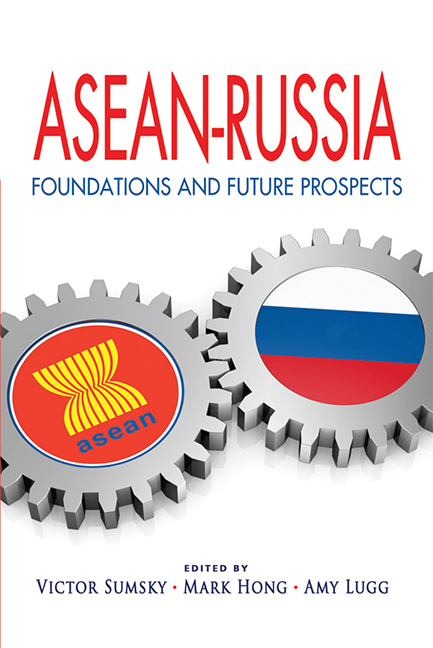Book contents
- Frontmatter
- Contents
- Foreword
- Preface
- About the Contributors
- Keynote Address
- Opening Remarks
- Keynote Address
- Introduction: Russia and the ASEAN Member States: Political and Economic Cooperation in Progress
- SECTION I WISEMEN'S VIEWS
- SECTION II GEOPOLITICS
- SECTION III BILATERAL RELATIONS
- What Singapore May Offer to Russia? The Present State and the Prospects of Relations
- Myanmar-Russia Relations in a Changing World: Growing Ties based on Strategic Partnership and Economic Prospects
- Russian-Myanmar Relations
- Russia-Thailand Relations: Historical Background and Contemporary Developments
- Russia and Vietnam: Building a Strategic Partnership
- Malaysia-Russia Relations: Revving up a Distant Relationship
- Cambodia and the USSR/Russia: Fifty-five Years of Relations
- SECTION IV Business and Economics
- SECTION V CULTURE AND EDUCATION
- EPILOGUE
- Index
Russian-Myanmar Relations
from SECTION III - BILATERAL RELATIONS
Published online by Cambridge University Press: 21 October 2015
- Frontmatter
- Contents
- Foreword
- Preface
- About the Contributors
- Keynote Address
- Opening Remarks
- Keynote Address
- Introduction: Russia and the ASEAN Member States: Political and Economic Cooperation in Progress
- SECTION I WISEMEN'S VIEWS
- SECTION II GEOPOLITICS
- SECTION III BILATERAL RELATIONS
- What Singapore May Offer to Russia? The Present State and the Prospects of Relations
- Myanmar-Russia Relations in a Changing World: Growing Ties based on Strategic Partnership and Economic Prospects
- Russian-Myanmar Relations
- Russia-Thailand Relations: Historical Background and Contemporary Developments
- Russia and Vietnam: Building a Strategic Partnership
- Malaysia-Russia Relations: Revving up a Distant Relationship
- Cambodia and the USSR/Russia: Fifty-five Years of Relations
- SECTION IV Business and Economics
- SECTION V CULTURE AND EDUCATION
- EPILOGUE
- Index
Summary
INTRODUCTION
Bilateral relations between Russia and Myanmar have more than sixty years of history. These have been positive relations. Russians never came to Myanmar as conquerors and never had any conflicts or controversies with Myanmar. For the last twenty years, Russia, along with the Association of Southeast Asian Nations (ASEAN) and China, has been among the leading foreign partners of Myanmar. For all that period Russia — be it in the United Nations or other international forums has continuously and from the positions of principle opposed internationalization and unfounded politicization of the so-called “Myanmar issue”.
For us in Russia, Myanmar is an important present and perspective partner. Such an approach is determined by her line in the international affairs and her ASEAN membership, as well as by her geographic location, size, natural riches and economic potential. The Russian-Myanmar interaction in the international arena is distinguished by common or very close approaches to all topical issues of the global agenda. Myanmar efficiently performs as the Russian-ASEAN dialogue partnership coordinator.
GENERAL ELECTIONS IN 2010
The general multiparty parliament election took place in Myanmar on 7 November 2010. It was convincingly won by the pro-government party of Union Solidarity and Development, which won 77 electoral seats all over the country. The election campaign of 2010 and the formation of the constitutional organs of state power brought new dynamics to Myanmar's political life. Thirty-seven parties took part in the election. Twenty-two parties, including the opposition parties, succeeded in gaining seats in parliaments at different levels. In November 2010, Aung San Suu Kyi was released after many years of home arrest.
A GENERATIONAL CHANGE
The political processes started in Myanmar seem to be radically changing the former system. The people of a new generation are coming to power. It is not significant whether they are military or civilians. The significance lies with the fact that their vision of the path of Myanmar's future is different from what we saw before.
- Type
- Chapter
- Information
- ASEAN-RussiaFoundations and Future Prospects, pp. 156 - 159Publisher: ISEAS–Yusof Ishak InstitutePrint publication year: 2012



